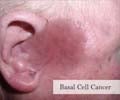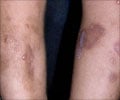Skin cancer can be treated more efficiently with two rheumatoid arthritis drugs like leflunomide and selumetinib, when given in combination.
Highlights
- Skin cancer can be treated more effectively when two rheumatoid arthritis drugs are combined
- Combining leflunomide and selumetinib can be more efficient in treating advanced skin cancer
- Melanoma can be treated if diagnosed early
TOP INSIGHT
The anti-rheumatic drugs like leflunomide and selumetinib synergize with MEK inhibition and suppress the growth of melanoma.
New Treatments for Skin Cancer
In the past few years, some new treatments have been developed for metastatic melanoma, and some are targeted towards specific genetic mutations.
Dr. Grant Wheeler from UEA's School of Biological Sciences and a lead researcher, explains that the disease can become resistant to most drugs rapidly and their research focuses on combination treatments.
He also said that by combining treatments, the disease could be attacked from different angles making it harder for the melanoma to develop resistance to drugs.
Dr. Wheeler and his colleagues from Norwich Medical School and UEA's School of Pharmacy focused mainly on leflunomide drug, which is an immunosuppressive drug used for treating rheumatoid arthritis.
In previous studies, leflunomide was found to be effective when used with drugs that target melanoma with a specific genetic mutation called BRAFV600E.
However, in their latest research, they have discovered that leflunomide was to found to work against melanoma and also tested it when given in combination with selumetinib, which is another melanoma drug. The study was published in the journal Oncotarget.
Selumetinib is one among the drugs that target the activity of a protein called MEK. Melanoma is addicted to this protein for its survival.
MEK inhibitors were already being used in combination with BRAF inhibitors to fight resistance.
However, this study shows that adding leflunomide to these drug combinations can be more efficient, revealed Dr. Wheeler's research that is partly funded by the John Jarrold Trust.
The research team tested leflunomide in the lab and found that it worked on melanoma cells irrespective of their genetic signature of cancer. This shows that it has the potential to be used in all melanoma cases and not just for those tumors that have BRAF mutations.
The results showed that leflunomide was able to stop the growth of tumor cells in the early phase by forcing them to kill themselves, which is a process that is known as apoptosis.
However, the research team combined leflunomide and selumetinib and found them to be even more effective than either drug working on its own.
The findings were replicated on mice that had melanoma tumors. Both the drugs were used together, which halted the growth of cancer entirely over a 12 day period. This was far more effective and had a significant effect than when used in isolation.
However, some questions that are yet to be answered before this combination could go into clinical trials, including testing whether melanoma can develop resistance to the treatment.
Dr. Wheeler said: "With melanoma treatments, the main problem has been the development of tumor resistance. One way this is being combatted is through immunotherapy treatments which harness the body's defenses. However, new combination therapies are always needed, and we need to identify new drugs that can be added to the arsenal of anti-melanoma therapies available for patients. It's possible that leflunomide could play that role."
What is Skin Cancer?
Skin cancer, a disease where malignant cells are found in the epidermis, the outer layer of the skin. The reason why skin cancers develop is due to exposure to the sun. Ultra Violet radiation from sun's rays cause damage to the DNA and results in gene mutations leading to skin cancer.
Skin, the most significant organ of the body, and can protect from injury and infections. Skin also regulates the body temperature and gets rid of waste substances through the sweat glands.
Skin cancer has to be detected early. 100 percent of skin cancers can be cured if found and treated soon. After treatment, it is always better to go in for regular check-ups to make sure that remission of cancer does not occur.
Source-Medindia
 MEDINDIA
MEDINDIA





 Email
Email










